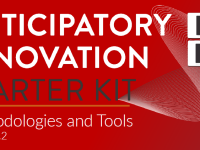Back when I was an exchange student in France, I lived in an apartment shared by nine people, all from different countries and cultures. We had a large kitchen and lived on the city’s main square, so it was a prime location to host some of the best house parties. Imagine: nine people each bring a dozen friends and you’ve easily got over a hundred people in your home! One of the things that most...
Global: Anticipatory Innovation & Foresight
The Anticipatory Innovation Starter Kit (AISK) offers a step-by-step approach to access a set of methodologies and tools to solve organisational challenges in the area of anticipatory innovation governance. Developed by the Experimentation Lab for Public Administration (LabX), part of the Administrative Modernisation Agency (AMA) in Portugal, the starter kit intends to be an actionable tool to envisage and anticipate changes in public sector organisations.
Users start in a "Pool of Problems"…
If your organisation had a crystal ball, what questions would you ask about the future? What would you do with the answers it received? In this post, we consider the ways in which innovation agencies – government-funded or managed institutions that provide financial and other support to catalyse private sector innovation – can use imagined visions of the future to shape present decisions. Today’s innovation agencies take on a wide range of tasks and duties,...
This report contains a summary of the anticipatory innovation review of Finland and is accompanied by a report which includes comprehensive analysis, methodology, and a detailed description of the anticipatory Innovation governance model. This work has been supported by the Directorate General for Structural Reform Support (DG REFORM) of the European Commission under the grant REFORM/IM2020/04.
Seismic events and trends like infectious disease, migration, climate change and technological disruption demand that governments respond rapidly and decisively. Yet without preparation, such decisions must be made from a rapidly diminishing number of options. Sometimes, there is only one clear path left to follow – and it is far from the best one. Finland is trying to identify a better way. The latest OECD report on “Anticipatory Innovation Governance Model: Towards a new way...
Work Area
Anticipatory Innovation
Governments require future-oriented innovations in order to respond to complex challenges, such as climate change, aging societies and digital transformation, in real time. Anticipatory innovation is the act of creating and implementing new, value-shifting innovations in environments of deep uncertainty, particularly for the purposes of exploration and shaping future priorities.

Insights from OPSI’s new learning network for innovation ecosystem practitioners Join OPSI and international practitioners 13:00 CET on 21 January for a second peer exchange on Orchestrating Innovation Ecosystems. Last year marked the launch of OPSI’s collaboration with the Investment and Development Agency of Latvia (LIAA) to explore how innovation ecosystems can be steered and enhanced through the application of anticipatory innovation governance approaches. Towards the end of 2021,…
2021 was yet another busy year at OPSI! As the rate and complexity of global challenges increases, so does our work. In cooperation with partners and counterparts, we complete another successful year of leveraging our expertise in global trends, public sector innovation systems, transformative technology and innovation skills, processes and methods. We held over 50 workshops, webinars and events Issued 13 reports Published 46 blogs And held hundreds meetings to drive the point home: that...
A summary report of the Government Beyond Recovery conference, which brought together over 2000 participants to reflect on the importance of innovation, co-creation, agile regulation and inclusion as the world emerges from a period of crisis and prepares for the complex challenges ahead.
This OPSI guest blog is written by Professor Leon Fuerth and Dr Sheila Ronis. Both served as co-researchers on The Project on Foresight and Democracy, funded by Rockefeller Brothers Fund and are currently co-directing the Project on Civic Leadership for the 21st Century at The Ohio State University. In the United States, liberal democracy is profoundly challenged by the accelerating rate of major forms of societal change, reflecting demographic transitions and technological revolutions. These…









